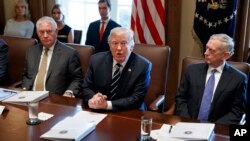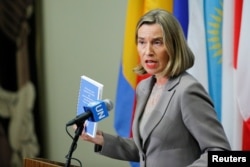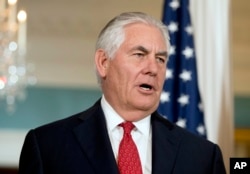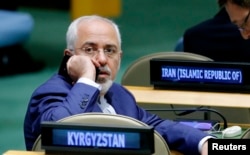President Donald Trump says his decision not to recertify Iran's compliance with the Iran nuclear deal could lead to its "total termination."
"That's a very real possibility," Trump said Monday as he began a meeting with his Cabinet at the White House. "Some people say that's a greater possibility."
In remarks that were at times prepared and other times off the cuff, the president said a lot of people agreed with what he did in pulling away from the 2015 accord, which Iran reached with the five permanent members of the U.N. Security Council and the European Union.
None of the other parties to the agreement have endorsed Trump's move, however, and EU foreign ministers, meeting Monday in Luxembourg, dispatched top diplomat Federica Mogherini to Washington to fight for the deal.
"Clearly, the ministers are concerned about the fact that messages on the JCPOA [Joint Comprehensive Plan of Action] might affect negatively the possibility of opening negotiations or opening even the space for negotiations with the DPRK [North Korea]," Mogherini told reporters after the bloc's 28 foreign ministers held talks.
Trump defended the decision Monday, saying he felt strongly that something had to be done about a deal he has railed against, both as a candidate and as president, even though he twice recertified the agreement in the first months of his presidency.
"I'm tired of being taken advantage of as a nation," he said at the cabinet meeting, flanked by Secretary of State Rex Tillerson and Secretary of Defense Jim Mattis. "This nation has been taken advantage of for many, many years. For decades frankly, and I'm tired of watching it."
The president did, however, hold out hope that the deal might be improved to his satisfaction when it goes back to Congress for further consideration. "We'll see what phase two is. Phase two might be positive and it might be very negative," he said.
'More complete strategy'
Tillerson said Sunday that Iran is in "technical compliance" with the international agreement to curb its nuclear weapons development, but said Trump wants Congress to adopt "a more complete strategy" to fix what the U.S. leader sees as flaws in the pact.
Speaking to CNN, Tillerson said Tehran has a "demonstrated practice of walking right up to the limits" of the 2015 deal, prompting Trump's decision not to certify compliance.
Tillerson, apparently explaining what "phase two" may entail, said Trump wants Congress — perhaps in a separate deal — to fix "a number of weaknesses" in the nuclear agreement, and address "a much broader list of threats" Iran poses with its military aggression and "destabilizing activities" in the Middle East.
Tillerson said Iran's ballistic missile tests, which are not banned by the nuclear pact, must be curbed and a more definitive ban imposed on its nuclear program. He said the current pact "simply postpones the reckoning" over Iran's nuclear ambitions.
In the meantime, while Congress considers whether to adopt new sanctions, Tillerson said the U.S. and the other international signatories need to "fully enforce the agreement."
Trust factor
Iranian Foreign Minister Javad Zarif, who negotiated the pact for Tehran, told CBS' Face the Nation show that with Trump's opposition to the deal, "Nobody else will trust any U.S. administration to engage in any long-term negotiation because the length of any commitment, the duration of any commitment, from now on with any U.S. administration would be the remainder of the term of that president."
Nikki Haley, the U.S. ambassador to the United Nations, told NBC, "I think right now you are going to see us stay in the deal, because what we hope is that we can improve the situation, and that's the goal. So, I think right now, we're in the deal to see how we can make it better, and that's the goal. It's not that we're getting out of the deal. We're just trying to make the situation better so that the American people feel safer."
Tillerson rejected the contention that Trump's decertification of the Iran deal weakens the U.S. position in dealing with the North Korean nuclear threat.
He said the U.S. stance on Iran means that it "will expect a very demanding agreement" with North Korean leader Kim Jong Un to end his nuclear weapons development.
Trump has told Tillerson that it is a waste of time to try to negotiate with North Korea, but Tillerson said the U.S. leader actually supports talks with Pyongyang.
"These diplomatic efforts will go on to the time the first bomb drops," Tillerson said in the CNN interview broadcast Sunday.







